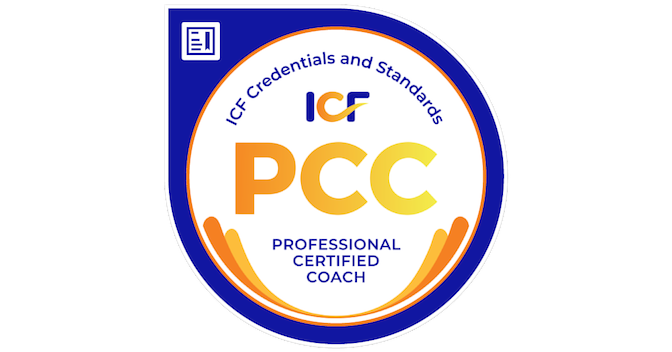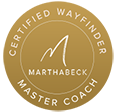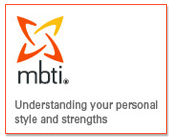Latest Blog Posts
I’m one of those people who always seems to have what I call “good luck within my bad luck.” I’ve run out of gas (within five feet of a gas station). I have flat tires (in my driveway). Recently, my car’s transmission died (in my garage). When I picked the repaired car up on a rainy day, I discovered my windshield wipers didn’t work (as I was driving out of the lot).
In each case, I could have held onto the first part of those stories – flat tire, ran out of gas, etc. – but what helped me cope was the fact that in each case the scenario could have been so much worse. I could have been on the side of a highway, stuck in an unsafe area, or far from available help or resources when each of these things happened.
I could cite examples about my health, career, and relationships as well, but I think you get the point: my choice in how to think about the situations allowed me to experience less suffering. Sounds fairly grand, using the word “suffering,” but let’s examine this a bit further.
My friend Betsy urged me to read Dr. Richard Wiseman’s The Luck Factor: How to Increase Luck in Your Life. Wiseman conducted years of interviews and experiments with over 400 volunteers and came up with an interesting conclusion: luck is something that can be learned.
He determined the Four Essential Principles of Luck:
Creating Chance Opportunities – According to Wiseman, “lucky people create, notice and act upon the chance opportunities in their lives.” They build and maintain what Wiseman calls a strong “network of luck,” meeting a large number of people and developing relationships with them. A relaxed attitude towards life gives lucky people an edge, too. Being calm and relaxed helps lucky folks notice opportunities more than those who are anxious and neurotic. They’re also more likely to create novelty in their lives, welcoming new experiences.
Feeling Lucky – Wiseman says “lucky people make successful decisions by using their intuition and gut feelings.” They listen to their “inner voice” and consider what it’s trying to tell them.
Thinking Lucky – “Lucky people’s expectations about the future help them fulfill their dreams and ambitions,” says Wiseman. They “expect their good luck to continue in the future.”
Denying Fate – Wiseman’s Principle Four says “Lucky people are able to transform their bad luck into good fortune.” Turns out, I’ve been employing this principle all along, as described earlier.
Want to be a lucky duck? Work on the following:
- building and maintaining relationships
- being relaxed and calm
- being open to new experiences in your life
- listening to your hunches
- using techniques such as meditation to boost your intuition
- assuming interactions with others will be positive
- not dwelling on ill fortune
Funny…haven’t I been writing about these activities in my newsletter all along? My clients would tell you we work on these activities in our work together, too. Dr. Wiseman’s a smart guy!
Recently, I attended the October Entrepreneurial Women’s Network luncheon. The hilariously outrageous and very entertaining keynote speaker, Mikki Williams, had some great advice. Maybe it’s because of what I do for a living, or maybe it’s because I just adore baked goods, but Mikki’s “PIES” acronym struck a chord. She suggested we challenge ourselves daily in the following ways:
Physically – do something you wouldn’t normally do. Enter a marathon. Walk further. Start walking. Learn to dance. Take up knitting. Anything that involves being and doing “physical” in a new way.
Intellectually – the hell with Sudoku. Think more fun. (Sorry to the Sudoku-lovers out there, but I just don’t get it.) Take a class that you normally wouldn’t take. This is going to sound weird, but rewire your brain by folding your arms or interlacing your fingers in the opposite way (think: left forearm over the right forearm, if you normally do it the other way. Or, left thumb over right thumb if you’re clasping your hands.) Use your opposite hand to do a routine task like brushing your teeth.
Emotionally – get mad at someone, if you’re usually too polite to do so. Tell someone you love them. Allow love into your life – adopt a pet from a shelter. Anything that expands your heart and allows you to be honest about your feelings is a good way to go.
Spiritually – create a relationship with a higher power, god, the universe, or whatever you need to call that force that feels larger than our tiny selves. Meditate. Sing. Pray. Serve others. Volunteer.
Using the PIES acronym to expand and enrich your life is a heck of a lot better than eating pie and expanding your waistline. Thanks, Mikki.
A few days ago, I went to a friend’s funeral. He died in one of those accidents that changes lives in an instant. 40 years old, a father of two teenagers, and someone with an incredible zest for life. This was a guy with motorcycles, a plane, and a thirst for speed. He was also a serial entrepreneur, creating opportunities out of situations most of us couldn’t even see. Anthony may have lived a relatively short life, but he lived a full one.
As I drove away from the cemetary, I thought about all the things on my List. You know, The List. Some people call it a Bucket List, or a Someday List, or a Dreams List. It’s the one where you put down the things that you’d love to do but seem ridiculously hard or scary or financially impossible or impractical to do right now.
And then I thought about how I really don’t want to leave this planet with a lot undone. If my mission is to help people live lives filled with passion and joy, I’d better be doing so myself. Since one of my items is to own a ranch with horses on it, I figure I’d better get started by being around horses and learning to ride them. I reached out to both of my friends who are horse whisperers (nope, I’m not making that up) and asked them if they’d take some time to teach me. Both said yes. I’ll be in Pennsylvania soon, learning the basics. And Arizona will follow this winter. I’ll let you know how it goes.
In the meantime, what can YOU do to take small steps toward those big dreams? The only thing that we know for sure is that we’ve got THIS moment. We’ve got no clue when the moments will run out. Sobering, yes. Motivating, definitely – if you want it to be!
It’s an old question, often asked when trying to learn more about someone’s ancestors. Although not often heard in that context any longer, the question is relevant in another one: your team, your supporters, your raving fans, your posse. Call ’em what you want, but they’re the folks you surround yourself with, and who hopefully have your back when life gets bumpy.
So, who are your people? Take a sec to make a list of names. I’ll be here.
Good. Now, ask yourself the following questions:
- Are they honest with you and can you be honest with them?
- Are they supportive of who you are and who you’re becoming?
- Do you truly enjoy being with them?
- Are they generally positive people?
- Do you have plenty to talk about with them?
- Would you count on them to be there for you during those “dark nights of the soul” and would you be there for them?
If you answered yes to each question, hang onto these folks! If some no’s crept in, it’s time to reconsider why these people are in your life.
So, why are they? What do you get out of keeping them near? Are you hanging on out of loyalty, or simply because you’ve known one another for a long time?
I’m certainly not advocating that you dump all of your friends or family, but if you’re sticking around out of misplaced guilt, loyalty, or avoidance of a confrontation, you’re not serving your (or their) greatest or highest good.
Caroline Myss says that we “evolve at the rate of the tribe that we are plugged into.” When I look at my tribe, I’m amazed and delighted by each and every face. And grateful, too.
It wasn’t always this way. In fact, the faces of my tribe are quite different than they were just a few short years ago. I wrote about this a while ago in a piece I called “Empty Elevators.” Below is an excerpt from that piece:
“It reminded me of the ’empty elevator,’ a term coined by Martha Beck. She says ‘It’s the period when you are climbing from one level of life satisfaction to a higher one, leaving behind any relationship with people who disagree with the change you are making. The good news is that the empty elevator always drops you off in a new place with new people who are living the life you dreamed about.’
Sometimes, the elevator-emptying isn’t obvious or dramatic. While there’s the occasional falling out with someone, where you agree to go your separate ways, it’s often more of a drifting away, until only the holiday card is written, or you can’t remember the last time you spoke with so-and-so. There have been periods where my life has felt more devoid of good friends than I would like, and there have fortunately been more periods of great abundance. I’m learning to be very grateful for the lonelier times, because they have more to teach me.
Elevator-emptying is a necessary part of growth and change. As we become more of who we’re meant to be, we often shed possessions, stories, wardrobes, beliefs, traditions, behaviors, and yes, even people. While in some cases it might feel sad to think of those we don’t see any longer, there’s always the opportunity to connect with those who better fit with the people we’ve become. And, sometimes, we find ways to re-kindle a connection, as I suspect I could do with someone I saw today. Even if it doesn’t happen, I’m grateful to have talked with people who were important to me a long time ago, because they reminded me of where I’ve been and where I’m headed, and I’ll hold the memory of their smiles wherever I go.”
My friend Amy loves to use the phrase, “Don’t get stale,” every time she tries something new and scary. She credits Mrs. Antonucci, a lady “of a certain age,” as they say in France, with giving her this advice a long time ago. Short and to the point, this advice is rock-solid.
When her life gets dull, Amy finds a way to stir things up. A few years back, when grieving the end of her marriage and feeling less than desirable, she decided to buy herself a great red bathing suit and pose for a portrait with the lifeguard squad (whose members also wear red suits) of her favorite beach town.
Could you do that? Amy didn’t think she could, either. Knees shaking, she asked the squad, and the guys couldn’t have been more cooperative. That photo still holds a place of honor in both her memories and in her home.
What’s stale in your life, and how can you shake it up? You don’t have to go as far as she did, but the world would be a lot more fun if more of us lived like Amy.
Are you trying to figure out what you’re meant to do with your life? What steps to take next? I recently participated in an activity in the South African bush that was a wonderful metaphor about this very dilemma.
During Martha Beck’s STAR retreat at Londolozi , five of us were taken into the bush and told we’d learn how to track animals. The ranger and tracker left the Range Rover and walked off, leaving us alone, searching for fresh rhino tracks (i.e., footprints).
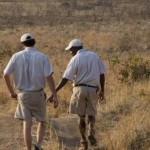
After a few minutes, they came back and asked us to get out of the vehicle. The lesson began.
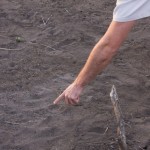
Solly (the senior tracker) and Boyd (ranger and coach) knelt to show us the shape/size of a rhino track, at what angle to stand so the sun wasn’t blocking the track, how partial tracks give clues about how the animal was moving and in what direction, what happens to blades of grass when they’re bent, how to check the growth (bushes, etc.) to see if a leaf (!?) has been disturbed, what dust on a blade of grass means…The more Solly and Boyd told us about what to look for, the more nervous I got. How on earth was I ever going to be able to do this? Dust on a blade of grass, for Pete’s sake! Pretty much how clients feel when they’re stuck.
Each of us would track for a few minutes, then rotate out and another would take over. We needed to pay attention and notice signs. Pretty much what I coach my clients to do.
The first track was pretty easy to spot in the sandy path, but further steps led into the stubby, dried grass. Crap…what now? Boyd called out – if you don’t see a track/clue, go back to the last one you saw and look again. Pretty much what we do in coaching, too.
So, back I went. I’m not sure what happened next, but suddenly I felt as though I was being pulled forward, and as if the tracks were popping up out of the ground. I pointed and said “there, and there, and there” over and over, and started walking a little faster. Boyd said “You’ve got it. Keep going.” I heard him say to someone “She’s good at this.” I thought, “Hey, I’m good at this. How cool.” And almost instantly, the tracks disappeared. I saw nothing. I went back to the last track, but couldn’t see anything. Someone else took over.
After the exercise, Solly told me I had a talent for tracking, and that he saw the moment when things went wrong. Tapping his forehead, he said “you started to use this.” Then, he tapped his heart and said “Always use this.” He was right. My intuition, my heart, and my senses stopped leading me when I let my thoughts about my performance get in the way. Yup, that’s pretty much what happens to my clients, too.
I realized then that tracking animals is exactly the same as tracking clues to find one’s purpose. Use your body, your heart and six senses, be still and calm, ask for help if you need to, realize that the clues may be very tiny, and stop thinking so much. It may take a while, or it may happen in a flash. Either way, you’ll get there.

I don’t know about you, but “I need your help” is one of the toughest things for me to say. I might occasionally utter the phrase “I need help,” in a vague, general sort of way, but actually telling someone that I need their help – well, that’s a whole other story.
I recently went on a road trip with my mother. A spry 73, she hates to admit that she can’t do everything by herself. I watched her struggle with luggage and almost fall rather than ask me to carry something for her. It’s easy to see where I got my independent streak from.
The vulnerability required to admit that we’re less than perfect seems to trip a lot of us up. We’re taught to be independent, to seem as though we’ve got everything under control at all times, and as the phrase goes, “never let ’em see you sweat.” To borrow from Dr. Phil, how’s that working for you?
I’m beginning to admit that it’s NOT working for me. So, I’ve decided to practice asking for help. If you know anyone who can help me with the following, I’d be grateful:
- ideas for speaking engagements (target audience: midlife women who want to make significant changes in their “status quo” lives)
- finding a good window replacement company
- bartering with a riding instructor for lessons
Now, it’s your turn. From whom would you like help? What’s stopping you from asking for it? If you’re fearing rejection, looking stupid or anything else, join the club. Then remember that doing things the way you always have (i.e., not asking) keeps you stuck.
If the people you’d like to ask for help are anything like me (and I suspect they are), they love to help others, especially when given specific information about what’s needed.
So, just ask already! After all, we’re all in this together.
I worked with a client this morning on her “Shoulds List.” As a homework assignment, I asked her to write a list of every “I should…” that came into her mind between our sessions. She came up with 37.
We started plowing through them. Should she really clean up the basement? Should she already have a job by now? Should she know more about what her right life looks like? Nope.
How do I know that? Because she hasn’t cleaned the basement, she doesn’t have a job, and she doesn’t know more than what she knows about her right life at this given moment.
We’ve all got a list of “shoulds,” likely even longer than my client’s. The time we spend on “shoulds” is just tilting at windmills (to borrow a reference from Don Quixote); it’s a useless exercise to be upset about what isn’t happening in our lives, simply because reality “is what it is,” to use that oft-repeated phrase.
The freedom we experience when we can let go of the notion that life should be any other way than exactly as it is in this very moment is nothing short of exhilarating. That doesn’t mean that if we don’t like the way life is at this moment, we can’t work on changing it. Doing so is a choice, as is believing that we can, as is deciding what story we tell ourselves about the facts at hand.
Want to experience more freedom? Spend one day noticing all the shoulds that creep into your thinking. And then, just let ’em go.
This morning, I was sitting in the waiting room of the mammography center, watching (on television) the loved ones of the people who died on September 11, 2001 recite each person’s name. I waited to hear the names of two firefighters who were family friends. As I listened to each name, my eyes fell upon a brochure that said “Awareness is what will bring us together to win the battle against breast cancer.”
In that moment, my brain turned the phrase around: Awareness of hatred will bring us together to win the battle against hatred. And, since battle is a form of anger, I think there’s an even better strategy to employ once we’ve identified hatred: love. I wish I could remember to whom these words should be attributed, but I can’t:
“Hatred is not ended by hatred, which by love alone, heals.”
The hatred instilled in those 18 men who boarded planes with the intention of killing themselves and many others was created by anger and fear, and was very likely years in the making. I often wonder how different the world would be if, instead, those men had known great love. I believe that no one who is in love with their lives and who knows profound joy could ever decide to do what they did that day.
I also believe that each of has the ability and the responsibility to notice hatred in all forms, whether it’s a KKK rally, or a much more subtle slur against one or many people. How often have we sat by silently while someone made an offensive remark, ignoring it rather than “making waves” by calling the offender out?
And isn’t hatred often just fear of the unknown? I’m reminded of another relevant passage: “There is no fear in love. But perfect love drives out fear.” – New Testament, I John
How can we inject more perfect love into our lives?
• Practice random acts of kindness
• Forgive the people who have done us harm
• Seek to understand our “enemies”
• Notice where we’re fearful and replace the fear with love
These simple steps may not always be easy, but they’re a surefire way to ensure that perfect love will exist in our world. And, if each of us does our part, we’ll change the world.

Last month, I decided it was time to slow down and just take things as they come, using the blank space in my calendar to recharge, etc. You know that saying about the best laid plans? I’m here to tell you that, once again, I’m living proof that when you stop worrying and just allow things to unfold, life is even better than any plan you could have dreamed up. Here’s what happened:
- I had more client sessions than the previous month.
- I started working with two new corporate clients on long-term engagements.
- I read books I’d been meaning to get to.
- I got the opportunity to be certified in a new 360 degree feedback instrument.
- I swam four days a week.
- I caught up with friends I haven’t seen in a while.
- I worked with a designer to revamp my web site and added a blog.
- I got an opportunity to go back to Londolozi, the game preserve in South Africa that I visited last year, with Martha Beck.
It wasn’t long before the empty August calendar was filled with business and personal opportunities. I’m convinced that when I stopped pushing so hard to know the outcome, plans unfolded exactly as they were meant to.
As a coach, I spend a lot of time talking to people about goals. While it’s important to have plans and goals, I think it’s even more important to be ready to abandon them in the face of what’s presenting itself in any given moment. What I’ve seen over and over again, both in my own life and the lives of my clients, is that trusting yourself to become comfortable with the abandonment of a plan is critical to creating a life you love.
If you’re frustrated by the lack of progress toward your goals, ask yourself the following:
- Where are you trying too hard to make something work?
- What do you think will happen if you change your mind or abandon a plan?
- What’s got you worried? Are you sure that the dismal fate you’re imagining is really going to happen? Really?
- What thoughts do you have around “should” or “can’t” or “shouldn’t”? Chances are, if those words are creeping into your thinking, you’re telling yourself a story that’s simply not true.
- How good would it feel to just stop being in control for even a little while?
I’ve found myself using this metaphor quite often: “I can only see as far as the headlights shine on the road ahead of me at night, but as long as I keep my foot gently on the gas pedal, I always have enough information to get me where I’m meant to go.”
Try it. And let me know about the magical events that transpire in your life after you do!

